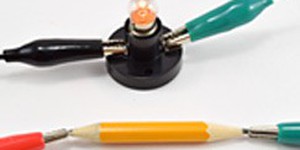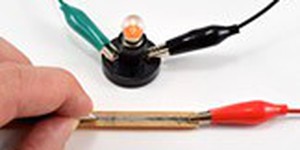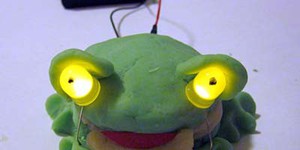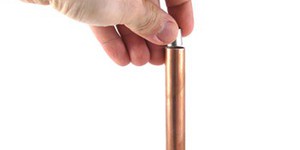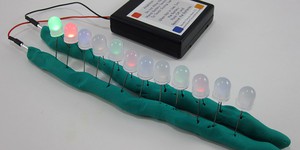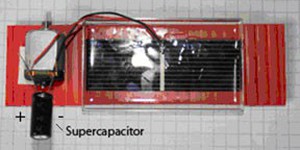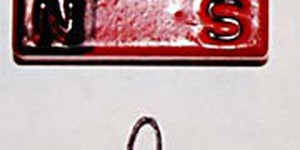Third Grade, Electricity & Electronics Science Projects (11 results)
Stop for a minute and try to imagine your world without electrical power and electronic gadgets.
No convenient appliances in the kitchen, no electric lights. No computers, MP3 players, television, or video games.
Your life would be completely different, wouldn't it? Electricity and electronics are so central to modern life that, paradoxically, they're easy to overlook.
|
Select a resource
Sort by
|
You may be familiar with permanent magnets—the kind that hang on a refrigerator. But did you know that other magnets, called electromagnets, can be turned on and off? When turned on, electromagnets act just like permanent magnets, but if you turn them off, their magnetic properties disappear. Electromagnets are an important part of many electronic devices, like motors, loudspeakers, and hard drives. You can create an electromagnet with a simple coil of wire and a battery. In this project,…
Read more
Featured
Have you heard that garlic powder is supposed to inhibit the growth of bacteria? Which do you think would make a better disinfectant: a solution of garlic powder or a solution of bleach? This project shows you a straightforward way to compare the effectiveness of different disinfectants (or other antimicrobial agents), by measuring zones of inhibition on a culture plate.
Read more
When your parents were kids, they probably wore polyester. Static cling was a major household issue! Now everybody wears cotton, which does not get static cling nearly as much. Why are some materials more susceptible to static cling than others? Investigate how well different materials produce static electricity by making a homemade electroscope and testing it out in this science project.
Read more
New
Have you ever wondered how your smart devices can recognize and distinguish your face from that of others? In this project, you will explore how to create and modify a facial recognition model using a type of artificial intelligence known as neural networks. This project is designed for beginners and requires little to no coding experience. Ready to give it a shot?
Read more
"Paper circuits" are a fun way to mix electronics and art by adding lights directly to a painting or drawing. These lights need a battery to power them, and typically you would use wires to connect them. In paper circuits, though, many materials can be substituted as "wire," including special types of paint, ink, and even aluminum foil. There are also different options for what type of battery you can use. Which materials do you think will work best? Try this project to find out!
Read more
What do you do with your old wooden pencils when they get too short to hold? Don't throw them away; you can use them to make circuits! This project will show you how to use pencils to make resistors, an important part of many electrical circuits, and test how they affect the brightness of a lightbulb in a simple circuit.
Read more
Dimmer switches let us control the brightness of a light, anywhere from completely off to full brightness. This can be nice when you want to set the brightness "just right," as opposed to a regular light switch that only lets you turn a light on or off. It turns out that you can make a dimmer switch out of an everyday object—a pencil! Try this project to find out how a dimmer switch can control the brightness of a light.
Read more
New
Many individuals who are blind or visually impaired use canes to navigate their surroundings, using their sense of touch to detect obstacles. What if you could create an electronic cane that emits an audible warning before coming into contact with an object? This project allows you to do just that by incorporating an ultrasonic distance sensor and a buzzer to alert the user of approaching obstacles. You can customize the cane by adding additional features or altering the design, such as using a…
Read more
Have you tried our first and second play dough circuits projects? Are you a master circuit artist, ready to try something even bigger and better? Try this project to see if you can build a three-dimensional light-up sculpture.
Read more
Did you know that not all trains run on tracks? Some of the world's fastest trains are magnetic levitation trains (maglev). This means that the carriage of the train is suspended over the rails with no support, but only with magnetic fields! There is a physical explanation for magnetic levitation, and if you would like to learn more about magnetism and current, this is a science fair project that you must try!
Read more
Have you tried our first electric play dough project,
and now you are looking for more to do? Do you want to learn more about circuits and add even more lights? Check out this project for part 2 of our play dough circuits series!
Read more
Solar cells are devices that can be used as a source of power when there is light shining on them, but they stop producing energy when they are not in the light. One way to store the solar energy for later use is to use a solar cell to charge something called a capacitor. The capacitor stores the energy as an electric field, which can be tapped into at any time, in or out of light. In this electronics science project, you will use parts of a solar car to experiment with the energy storage…
Read more
This is a straightforward project that shows you how data can be digitized and stored on magnetic recording media. You'll learn how alpha-numeric characters are digitized, and you'll use bar magnets to represent the individual data "bits." You'll also learn about how much information can be stored in a small space (recording density), and how magnetic data can be erased.
Read more
|
Explore Our Science Videos
Paper Roller Coasters - Fun STEM Activity!
Aluminum Foil Boat Design - STEM Lesson Plan
Solubility Science – STEM Activity








